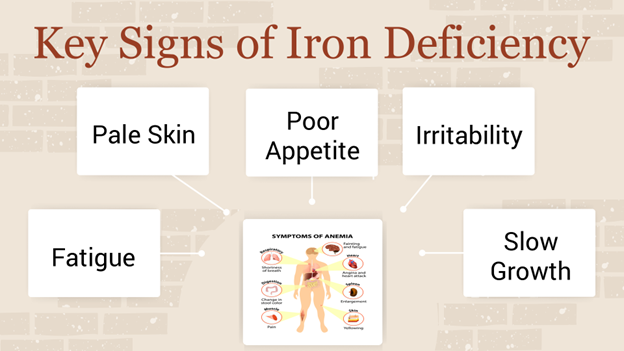Iron deficiency anemia in children is a condition that occurs when a child has too few red blood cells due to a lack of iron in their diet. It’s an important topic because iron helps carry oxygen throughout the body. Without enough iron, children’s bodies cannot function properly. This deficiency can impact their growth and development, making it crucial for parents to understand what causes iron deficiency anemia in children and how to address it effectively.
Iron Deficiency Anemia: Facts Every Parent Should Know
Iron deficiency anemia in children is when there are not enough red blood cells to carry oxygen well. Iron is crucial because it forms hemoglobin, the stuff that helps carry oxygen in the blood. Without enough iron, children can feel weak and tired.
It’s vital for kids to have enough iron in their diets. Children who lack iron may face problems in their physical growth and learning. Parents should be aware of this because children need iron to develop both mentally and physically. In essence, knowing what causes iron deficiency anemia in children can help in keeping them healthy and vibrant.
Children’s Proneness to Iron Deficiency Anemia
Children are at risk of iron deficiency anemia because of their rapid growth. During growth spurts, their bodies require more iron, which must come from their diets. Babies and toddlers, in particular, are very susceptible.
- Reasons children are prone include:
- Rapid growth rates needing more iron.
- They might eat too many iron-poor foods like snacks and sweet cereals.
- Infants might not get enough iron from breast milk if the mother’s diet lacks iron.
Dietary habits also play a big part. Young ones may not like iron-rich foods, relying instead on less nutritious options. Parents should ensure a balanced diet to prevent iron deficiency anemia in children, particularly during critical growth phases.
Identifying Symptoms and Their Impact on Development
Recognizing symptoms of iron deficiency anemia in children is essential. Early signs include paleness, lethargy, and irritability. As it progresses, children may experience headaches, shortness of breath, and lack of concentration.
These symptoms matter a lot since they can affect a child’s development and learning: – Children might struggle in school. – They may show delayed cognitive development. – They could have behavioral issues from frustration and fatigue.
Understanding these symptoms helps parents take timely actions. Getting proper treatment can lead to better health outcomes, enhancing children’s learning and social skills.
Causes and Misconceptions of Iron Deficiency
Iron deficiency anemia in children often results from poor diet. Some myths can mislead parents, such as assuming a food is iron-rich when it’s not. It’s crucial to get the right information.
- Common Causes:
- Not eating enough meat or iron-fortified cereals.
- Consuming too much cow’s milk, which can hinder iron absorption.
Some think milk is a good iron source, but it’s actually the opposite. Too much cow’s milk may crowd out other nutrient-rich foods.
Effective Solutions and Nutritional Adjustments
Parents can prevent and treat iron deficiency anemia in children through diet. Incorporating more iron-rich foods into daily meals is a great start.
- Good Sources of Iron include:
- Lean red meat and chicken.
- Leafy green vegetables like spinach.
- Iron-fortified cereals.
For vegetarian children, iron is found in beans, lentils, and tofu. Some at-risk infants may require iron supplements, but always follow a healthcare provider’s advice. Ensuring a balanced diet helps meet children’s nutritional needs and prevent iron deficiency anemia.
Community Awareness and Proactive Healthcare
Routine health check-ups at places like Prabhat Medical Center are essential. They help in early detection and management of iron deficiency anemia in children.
Community programs can educate parents on preventing iron deficiency. In places like India, outreach is vital for spreading awareness and encouraging healthy dietary practices.
A Future of Healthier, Smarter Children
Encouraging healthy habits and regular check-ups can ensure children grow well. Parents should seek professional advice if they suspect any signs of iron deficiency anemia in children. Embracing positive nutrition changes leads to a healthier future.

